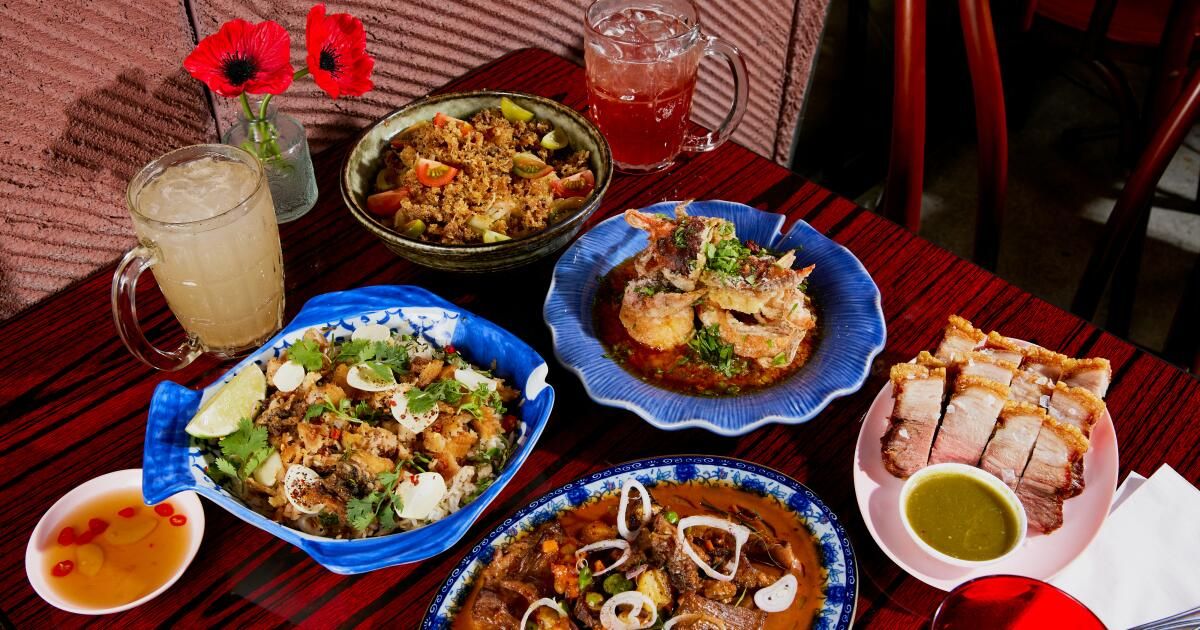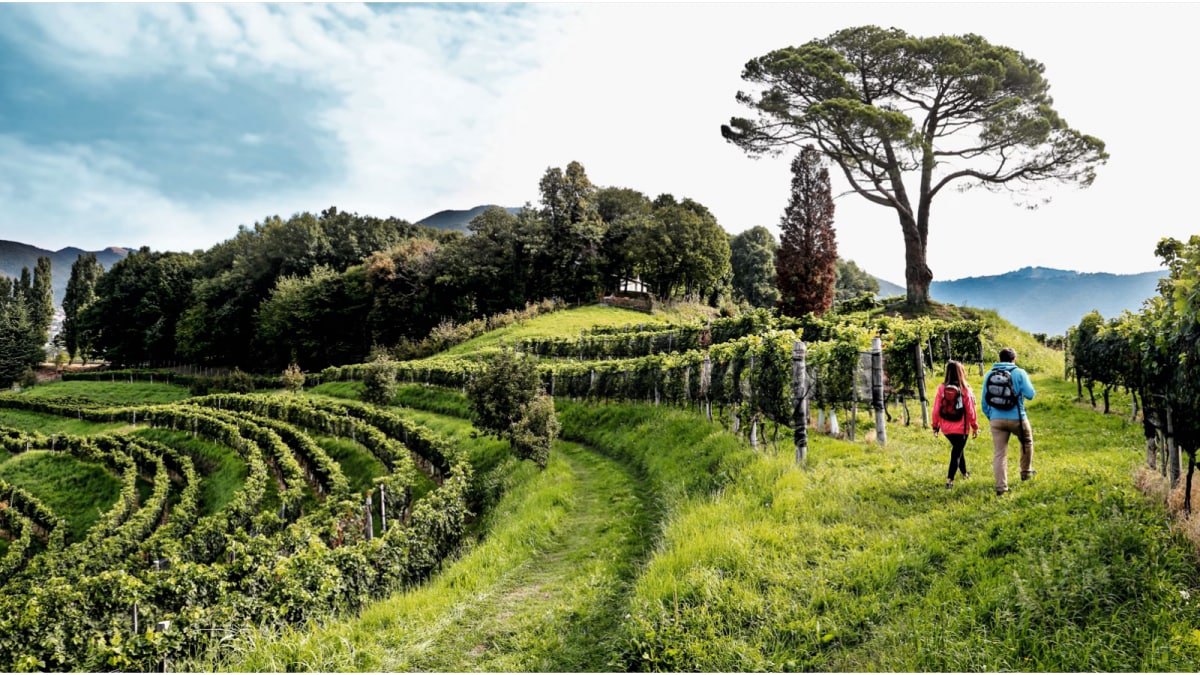In late 2020, a red neon sign spelling out the words “Holy Basil” appeared above a takeout window at a downtown food hall still under construction, and Thai food in Los Angeles tilted slightly on its axis.
Wedchayan “Deau” Arpapornnopparat and Tongkamal “Joy” Yuon had started the project as a pop-up restaurant in August, serving a handful of rotating dishes culled from Bangkok’s street food canon. Pad see ew chugged with a hint of smoke, wok hei searing so deeply into the wide noodles that their potency could withstand even the indignities of takeout containers. So would the fluffy, crispy skin of moo krob, its crunch giving way to the satiny pork belly meat beneath.
Gra prow (minced meat stir-fried with holy basil, the herb that gives the dish its name in Thai) was seasoned with garlic and the citrusy heat of bird’s eye chilis. We ordered it with a fried egg, whose yolk remained runny and its curled edges crisp, and the dish was both comforting and heart-racing, qualities that helped many of us feel human during those days of isolation.
Memorabilia at Holy Basil on Atwater: It follows a narrow space between two buildings. It's not exactly hidden; there's a row of outdoor tables and a small dining room with a few dozen seats that don't stay empty for long.
Holy Basil went through the expected phases of a business forged in the pandemic. Sometimes, the small staff handled deliveries. By early 2021, customers could walk through the window to pick up their orders, and eventually the Santee Passage food hall was packed with seating.
From the start, the city’s food obsessives gravitated toward Arpapornnopparat’s visceral, unbridled cooking style. As he adapted, his approach to food became more personal and subtly experimental.
That evolving tone drives the small neighborhood spot Holy Basil that he and Yuon worked for nearly two years to open in Atwater Village in January.
Follow the sign to Glenwood Boulevard and look into the narrow space between two buildings to see the telltale neon sign.
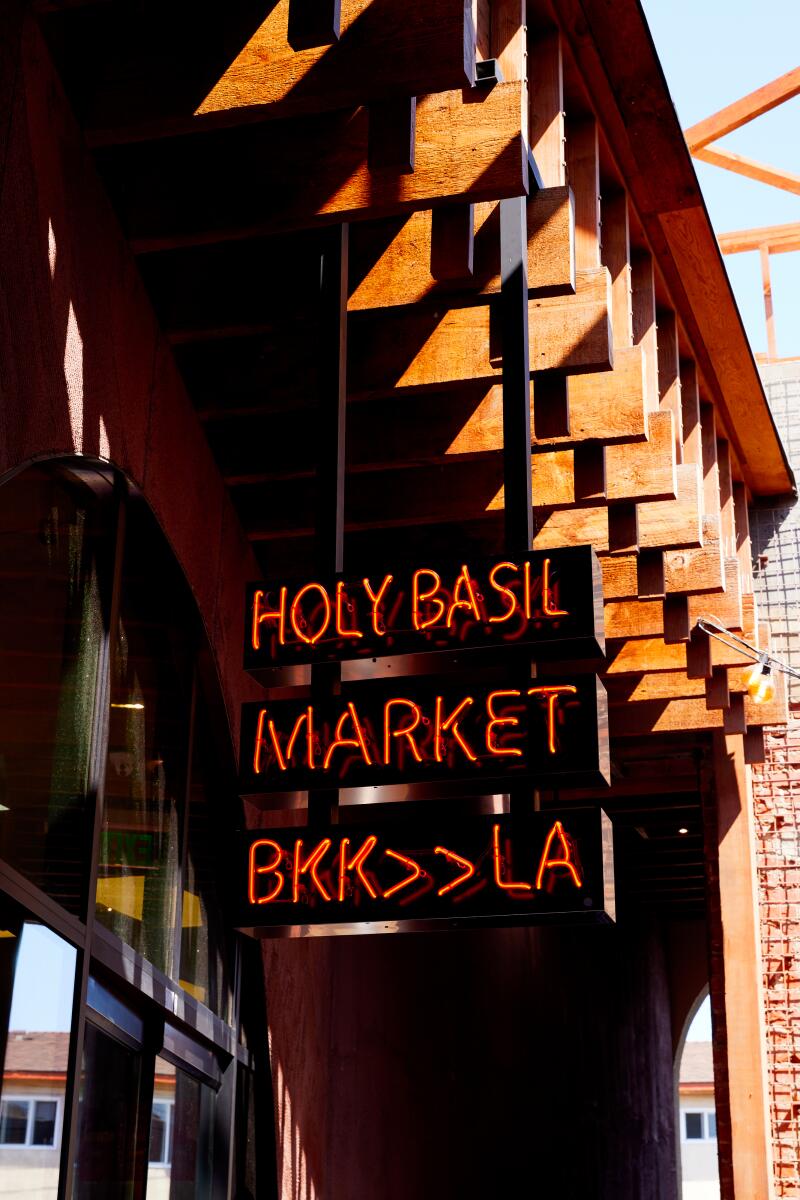
Holy Basil's telltale neon sign.
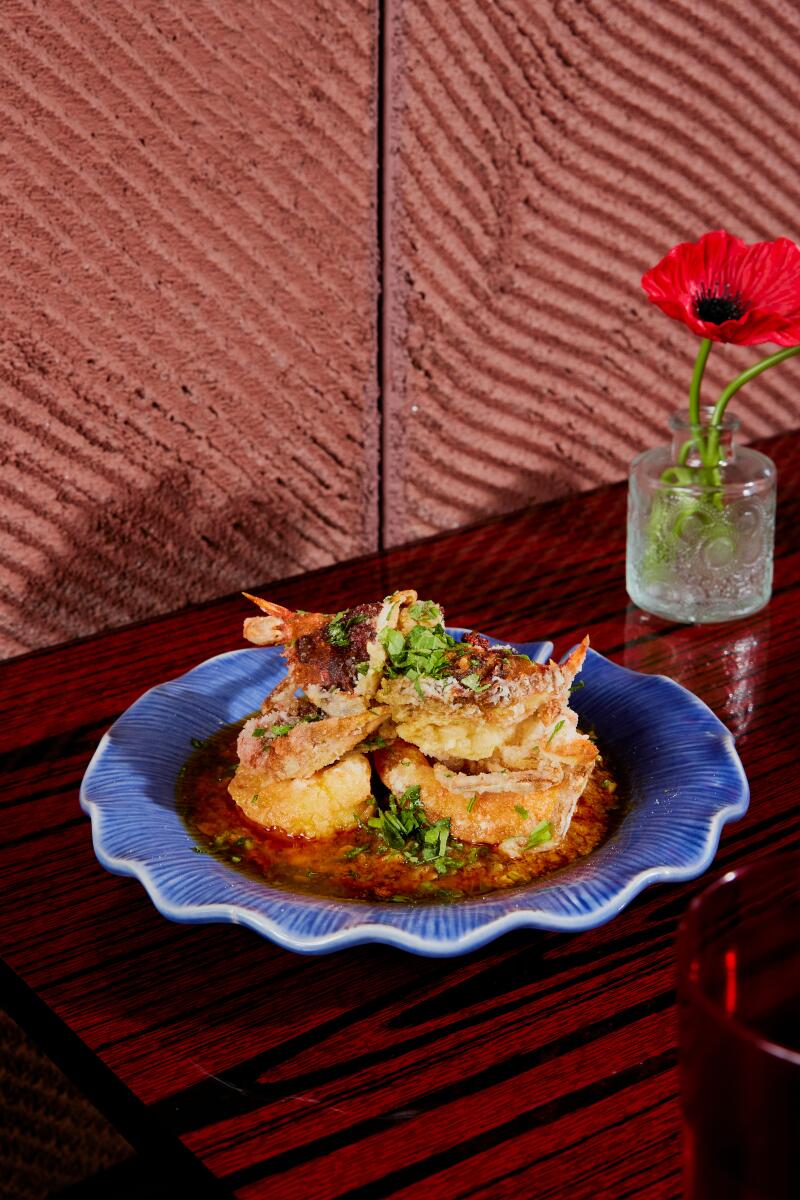
Soft shell crab with Holy Basil salted yolk.
Despite the lack of street presence, I wouldn’t say the place is hidden. With its row of outdoor tables pressed against an exterior wall and its small dining room wrapped around an open kitchen, it’s rare for one of the restaurant’s 38 seats to remain empty for long, day or night.
The moment seems ripe for Arpapornnopparat’s skill and storytelling. Among the specialties of dozens of Los Angeles’s most prominent restaurants are many dishes noted for their region of origin. Chiang Rai-style sai ua, its almost stringy sausage with lemongrass and other coarse herbs, at Amphai Northern Thai Food. Sapp Coffee Shop’s soothing jade noodles and the equally invigorating boat noodles inspired by Ayutthaya in Thailand, where rivers crisscross through the port city. Turmeric-tinged kua kling, one of Jitlada’s many incendiary southern Thai curries perfected by the late Suthiporn “Tui” Sungkamee, whose legacy is carried on by his sister Sarintip “Jazz” Singsanong.
Arpapornnopparat is mindful of tradition, but he also weaves his life’s trajectory into his recipes. He was born in Bangkok to a food-loving family; the table featured dishes that reflected his father’s Chinese heritage. In sixth grade, he left Thailand to attend school in Bangalore, India, eventually moving to the United States, where he studied to become a graphic designer. He and Yuon, who are married, met nearly 20 years ago when they were working at Chan Dara on Pico Boulevard.
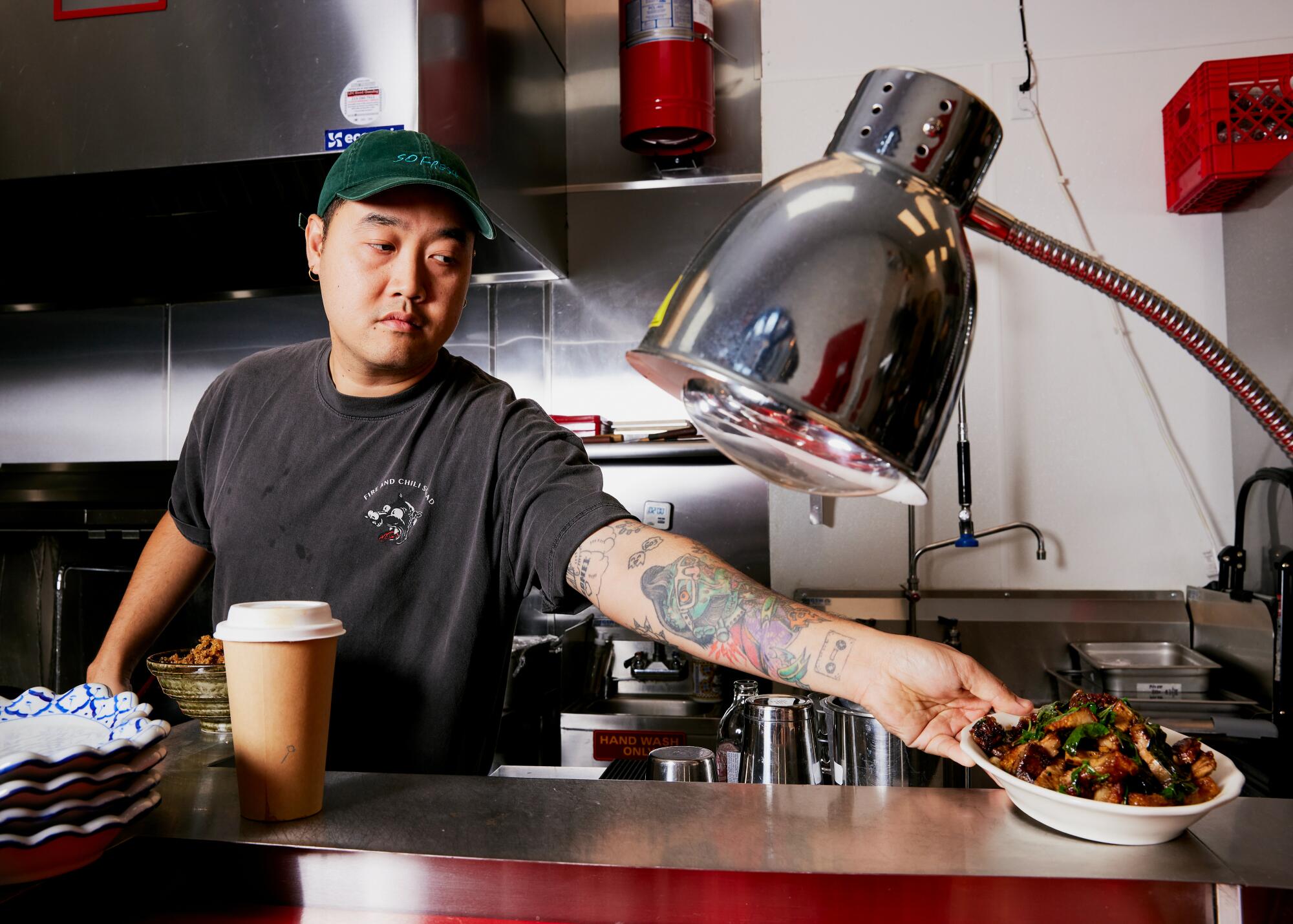
Chef Wedchayan “Deau” Arpapornnopparat was born in Bangkok, went to school in Bangalore, India, and eventually moved to the United States.
At Atwater Village, Holy Basil's original favorites, like pad see ew and gra prow, have been preserved, but the concise menu also leaves room for improvisational pieces.
Take a recent dish centered on fried soft-shell crabs and shrimp. It’s the thick sauce that confounds in exciting ways, making a take on a Bangkok classic, stir-fried squid with salted egg yolk. Arpapornnopparat repurposes the egg as the star ingredient, offsetting its umami flavor with the sweetness of browned butter, then adding shrimp paste, shrimp oil, scallion oil, and cooking wine. In its sharp left turns of salt, acid, and sensual funk, the brain longs to consult a GPS. But there is no map. These are flavors from an inland land.
Another sauce-driven dish, made from freshly made gaeng garee (yellow curry) paste, it started out as a vehicle for whole, split Dungeness crab before shrimp took center stage. Juicy slices of Chinese celery break up the rich, coconutty creaminess. You inhale the curry’s sweet and spicy spices before they register on your tongue. Coriander seeds dominate, but just barely, and their floral notes bounce pleasantly off scattered Sichuan peppercorns that have been tempered in oil. They tingle as they crunch against your teeth, but not so much that they crush each subsequent bite.
It's helpful to have a bowl of rice on the side to soak up as much of the sauce as possible.
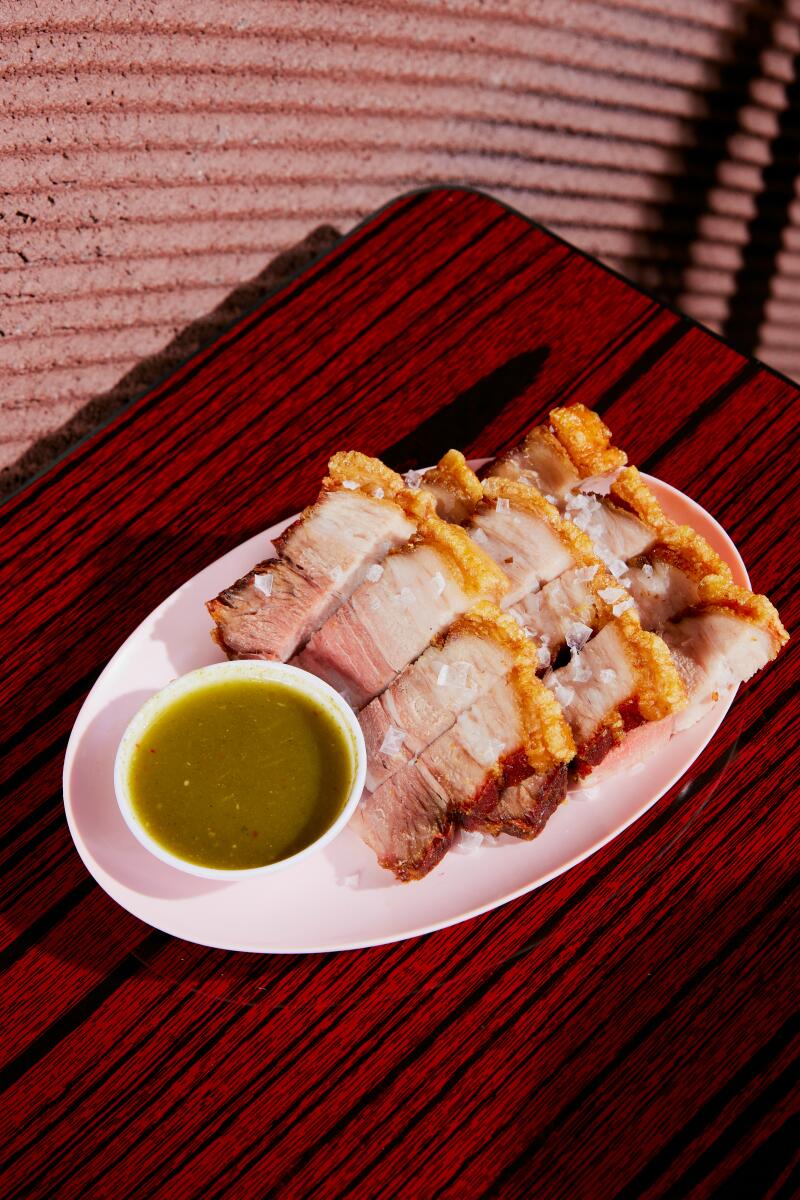
Moo krob, pork belly with fluffy, crispy skin, with a crunchy touch.
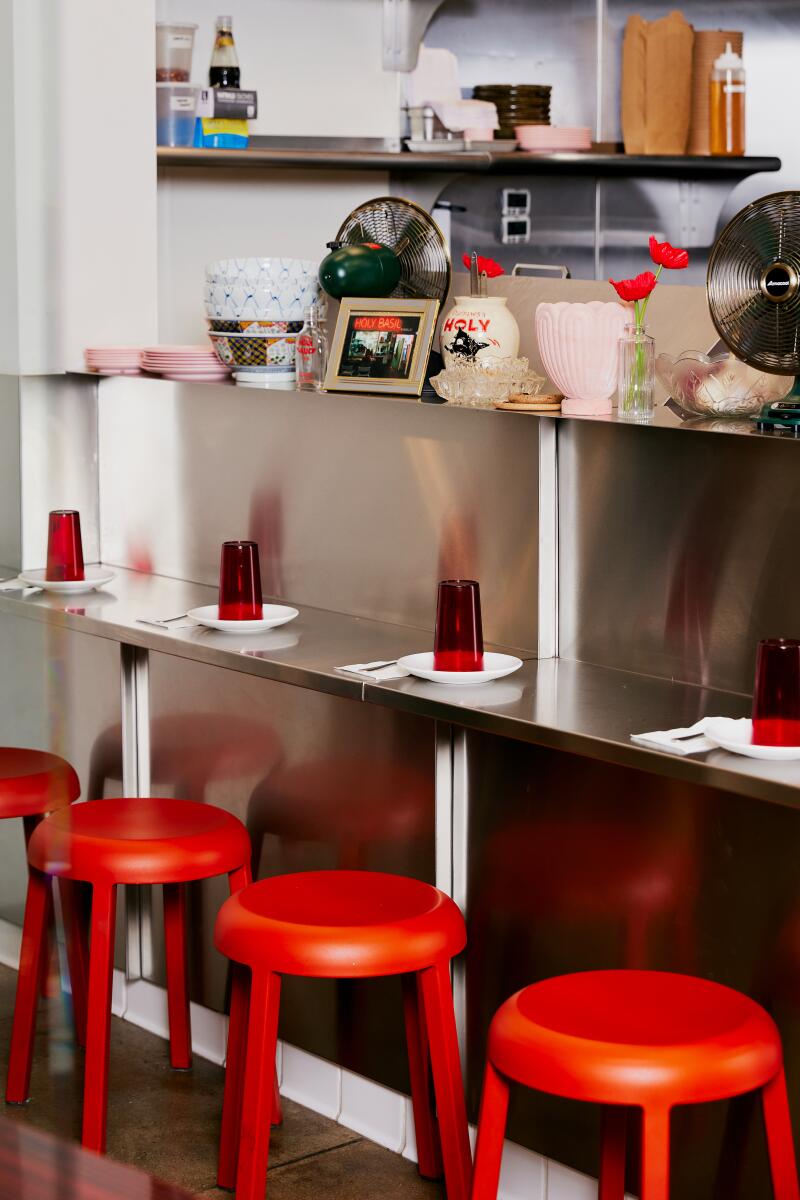
Sit at the new Holy Basil in Atwater.
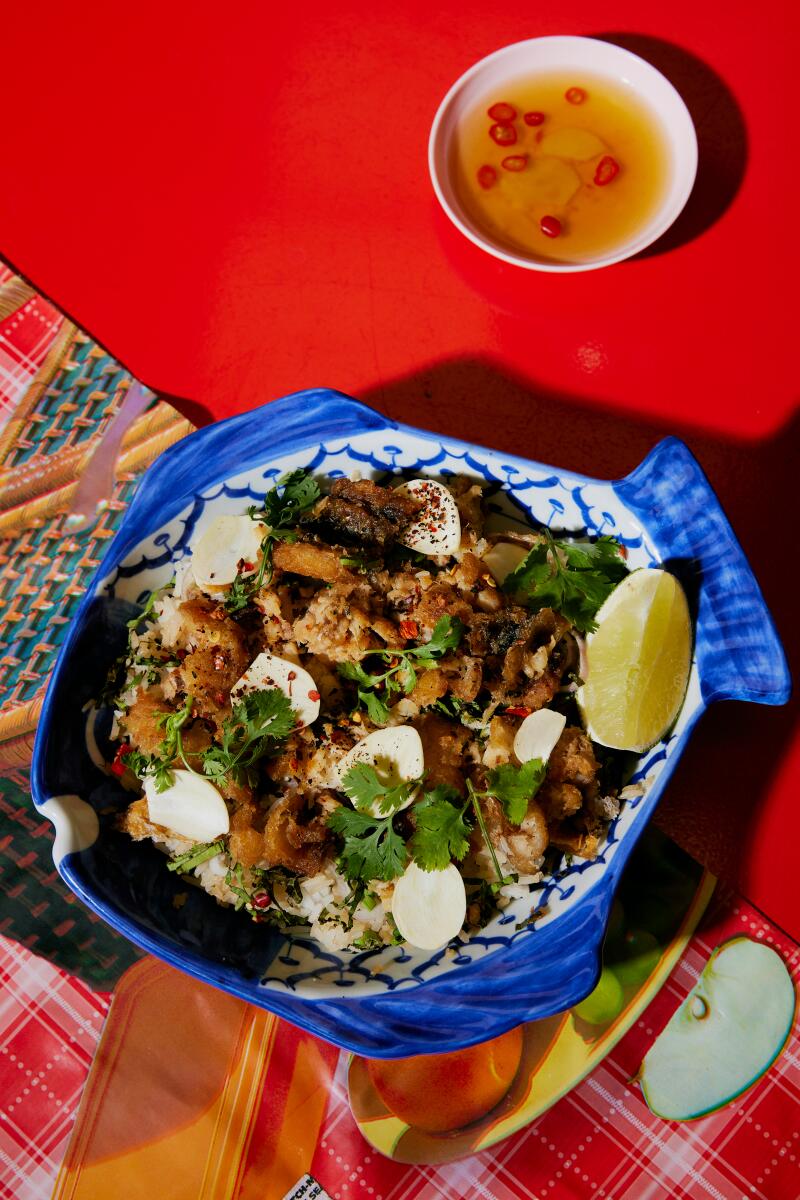
Grandma's fish and rice.
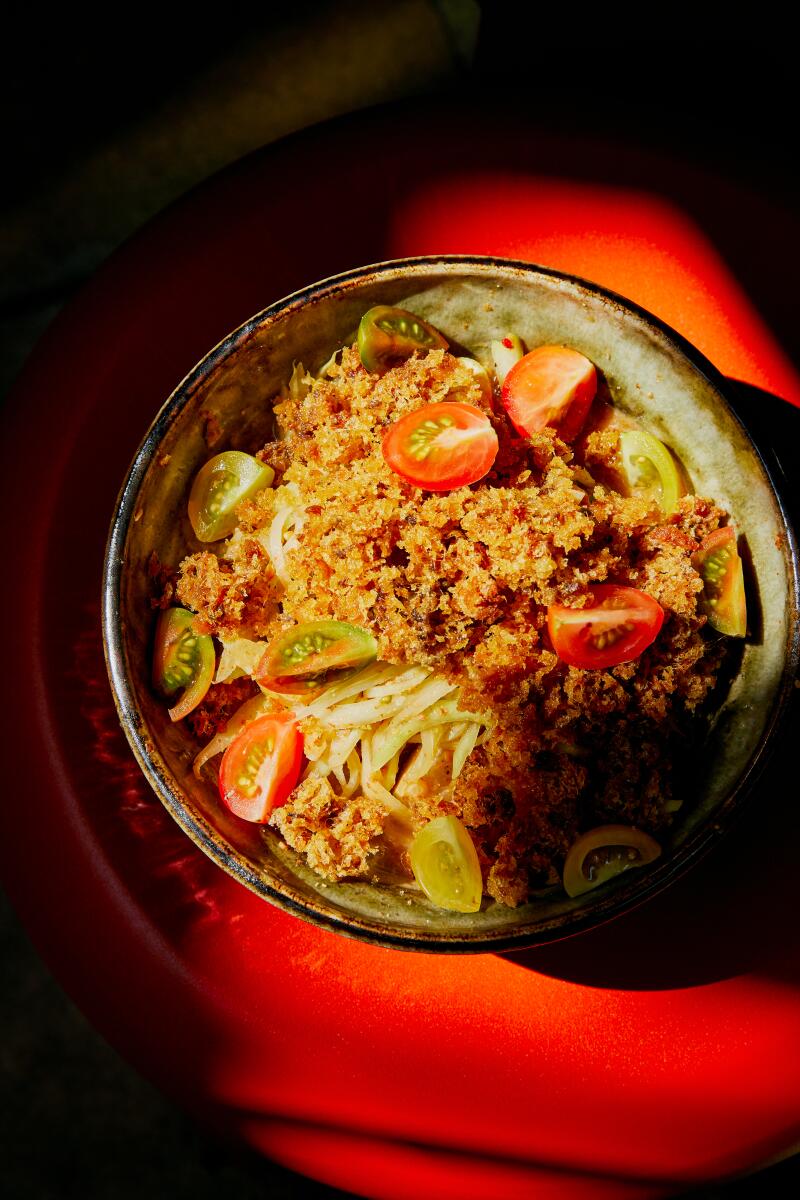
Santa Albahaca Papaya Salad.
Counter these complexities with a few simple options: mu crab, its skin like that of downtown cuisine, as satisfying as devouring a warm chicharrón; fried chicken wings accompanied by a handful of shishito peppers; an easy-listening fall duo of eggplant and squash in a light black bean sauce scented with basil leaves. Renderings of shrimp aguachile and a variation on beef tataki drenched in chile-lime vinaigrette nod to two of L.A.’s most important cuisines.
Arpapornnopparat brings his imagination home with a take on a childhood classic made by his grandmother. He fries barramundi, crumbles the fish into attractive flakes and scatters it over herbed rice, shallots, a slice of lime and fish sauce spiced with sliced chilli and garlic. The play of soft textures and gentle jolts of acidity are a balm. I would suggest this trip down the chef’s memory lane accompanied by excellent versions of fried rice with strands of crab or chewy, oily chunks of wagyu beef.
It’s probably important to note that the two Holy Basil outposts are siblings with their own personalities, not identical twins. In Atwater Village, Arpapornnopparat makes pad see ew with thin noodles, like the ones he made as a kid. I prefer flat noodles, ideal for absorbing the smoky breath of the wok, so I head downtown for the dish and its pad kee mao drizzled with a splash of whiskey and an aromatic green curry that I’ve loved since the early days of the takeout window.
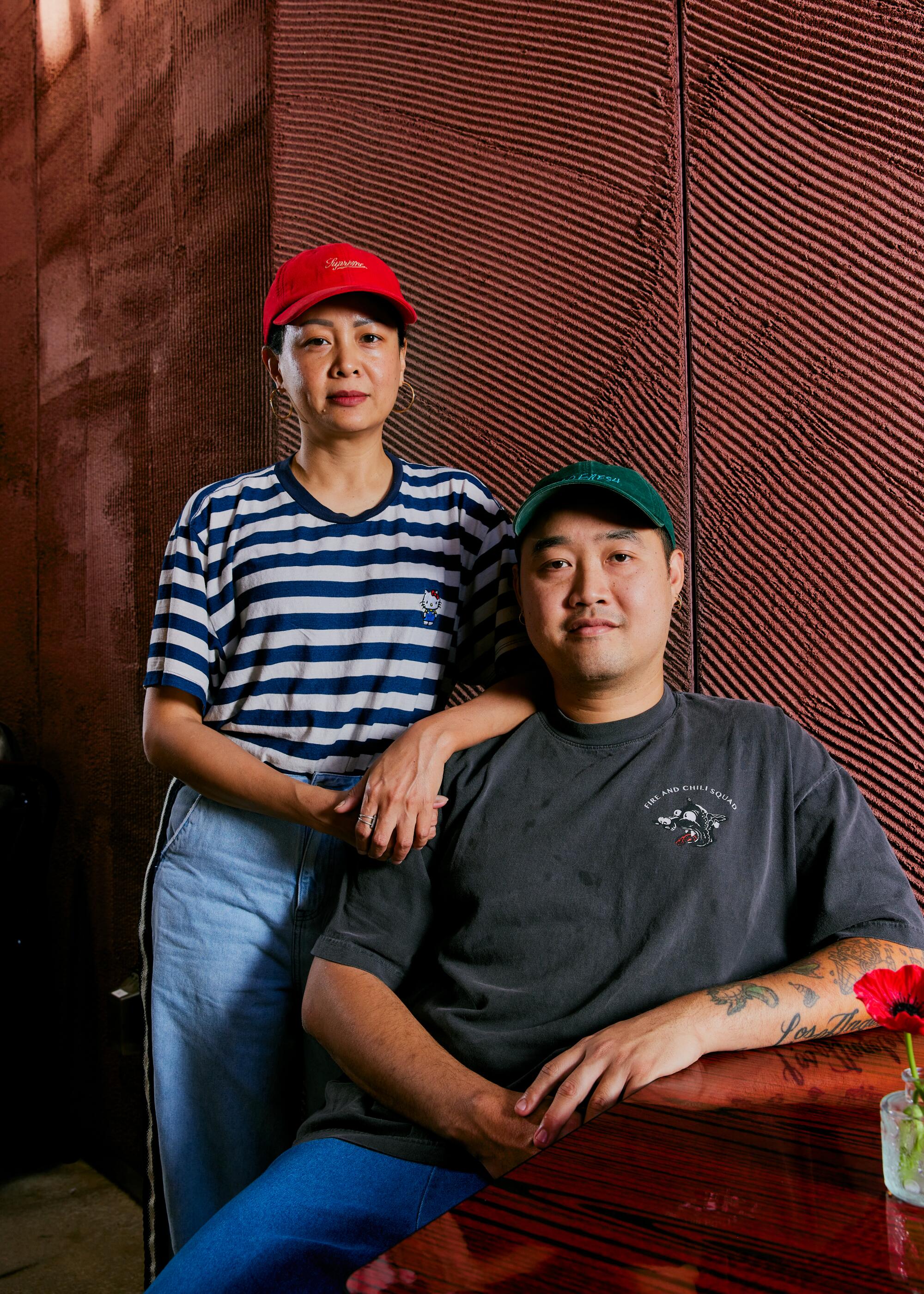
Wedchayan “Deau” Arpapornnopparat and Tongkamal “Joy” Yuon opened the first Holy Basil as a pop-up restaurant, serving a handful of rotating dishes selected from Bangkok street food.
Arpapornnopparat and Yuon are idea people. Before turning to restaurants, they ventured into entrepreneurship with a line of natural sweeteners made from fruits and herbs. From those efforts, Yuan developed a canned version of Thai iced tea with oat milk that is arguably the best thing to have for lunch or dinner while Atwater Village awaits its liquor license.
For a while, before they had two restaurants to run, they hosted pop-up events on weekends at the downtown food hall called Yum Los Angeles; it was an incubator for some of the refined innovations I’ve mentioned. The couple originally conceived of their second location to serve Thai tasting menus, and they haven’t given up on opening a third location to pursue that ambition.
How good, though, when big dreamers achieve every stone in their path.
Holy Basil Atwater Village
3170 Glendale Blvd., Unit C, Los Angeles, instagram.com/holybasil_la
Prices: Small plates $6-$18, noodle and rice dishes $16.50-$22, most main dishes $16-$25.
Details: Monday-Friday, 11 a.m.-3 p.m. and 5 p.m.-8:30 p.m.; Saturday-Sunday, 12 p.m.-3:30 p.m. and 5 p.m.-8:30 p.m. Liquor license pending. Street parking. Restaurant takes reservations. I recommend going for dinner early; sometimes the kitchen runs out of popular dishes. Street and parking lot available.
Recommended dishes: Soft shell crab in brown butter sauce, wild shrimp curry, moo krob, beef tataki, eggplant and pumpkin, fish and grandma's rice.

